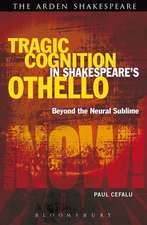Revisionist Shakespeare: Transitional Ideologies in Texts and Contexts
Autor P. Cefaluen Limba Engleză Hardback – 24 noi 2004
Preț: 386.22 lei
Nou
Puncte Express: 579
Preț estimativ în valută:
73.91€ • 79.03$ • 61.62£
73.91€ • 79.03$ • 61.62£
Carte tipărită la comandă
Livrare economică 17 aprilie-01 mai
Preluare comenzi: 021 569.72.76
Specificații
ISBN-13: 9781403964847
ISBN-10: 140396484X
Pagini: 256
Ilustrații: IX, 212 p.
Dimensiuni: 127 x 203 mm
Greutate: 0.37 kg
Ediția:2004
Editura: Palgrave Macmillan US
Colecția Palgrave Macmillan
Locul publicării:New York, United States
ISBN-10: 140396484X
Pagini: 256
Ilustrații: IX, 212 p.
Dimensiuni: 127 x 203 mm
Greutate: 0.37 kg
Ediția:2004
Editura: Palgrave Macmillan US
Colecția Palgrave Macmillan
Locul publicării:New York, United States
Cuprins
Introduction The Early Modern Original Condition: Natural Rights and Marxist Ethics in King Lear The End of Absolutism: Coriolanus and the Consensual Nature of the Early Modern State Rethinking the Discourse of Colonialism in Economic Terms: Captain John Smith's Virginia Narratives, Vagrancy and the Tempest Mercantilist Fallacies and Subjective Demand: Early Modern Theories of Value and the Merchant of Venice 'Damned Custom...Habits Devil': Hamlet, Antidualism, and the Early Modern Philosophy of Mind
Recenzii
"This intelligent book argues that Shakespeare's plays are much more thoughtful about their world - and constructions of it - than often believed. Cefalu shows that rather than allegorically reflecting historical reality and change, such plays as Hamlet and King Lear meditate on profound contradictions in early modern society and ideology. Usefully enriched by attention to intellectual history and literary form, Revisionist Shakespeare comes as a welcome qualification of new historicism and cultural materialism alike. No serious student of Shakespeare and early modern literature can afford to overlook this book." - Douglas Bruster, author of Shakespeare and the Question of Culture
"Paul Cefalu is properly wary of the tendency on the part of many early modern literary critics to align literary characters - in King Lear, The Merchant of Venice, and Coriolanus, for example - into two ideological camps, the old feudal guard and the new bourgeois individualists. He rejects both idealized narratives of progress and orthodox Whig-Marxist theories of ideological class conflict, preferring instead Marx's primitive accumulation model of the rise of capitalism. He sees Shakespearean drama as allegorizing functional contradictions and historical ironies that are specific to a range of early modern institutions and belief systems, including the Elizabethan poor law regime and the management of vagrancy, theories of economic value, the nature of statecraft, Protestant ethicaltheory, and Augustinian notions of sinful habituation. Cefalu's interest in how things work rather than why Shakespearean characters act as they do makes for a compelling, tightly-argued plea on behalf of a new methodology for understanding the representation of social and economic change in Shakespearean drama." - David Bevington, Phyllis Fay Horton Distinguished Service Professor in the Humanities, University of Chicago
"Paul Cefalu is properly wary of the tendency on the part of many early modern literary critics to align literary characters - in King Lear, The Merchant of Venice, and Coriolanus, for example - into two ideological camps, the old feudal guard and the new bourgeois individualists. He rejects both idealized narratives of progress and orthodox Whig-Marxist theories of ideological class conflict, preferring instead Marx's primitive accumulation model of the rise of capitalism. He sees Shakespearean drama as allegorizing functional contradictions and historical ironies that are specific to a range of early modern institutions and belief systems, including the Elizabethan poor law regime and the management of vagrancy, theories of economic value, the nature of statecraft, Protestant ethicaltheory, and Augustinian notions of sinful habituation. Cefalu's interest in how things work rather than why Shakespearean characters act as they do makes for a compelling, tightly-argued plea on behalf of a new methodology for understanding the representation of social and economic change in Shakespearean drama." - David Bevington, Phyllis Fay Horton Distinguished Service Professor in the Humanities, University of Chicago
Notă biografică
PAUL CEFALU is Assistant Professor at Lafayette College, Pennsylvania, USA.





